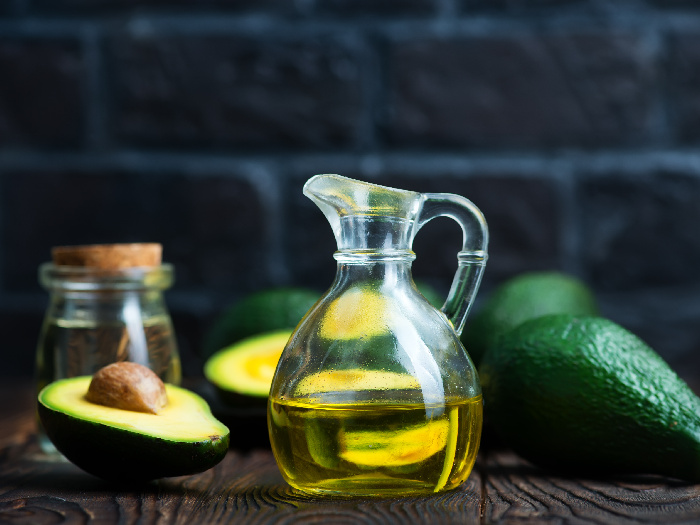In the debate of avocado oil vs olive oil, it may be difficult to say if one is healthier than the other. However, there are certain differences that can help you make the correct choice between the oils for certain recipes as well as skincare.
Avocado Oil Vs Olive Oil
While olive oil has been around for centuries, avocado oil is relatively new to the supermarket aisle. Both are plant-pressed oils made wholly from fruits – yes, olives and avocados are technically fruits. For avocado oil, the avocado is pitted and skinned, and the pulp is separated from the avocado oil in a centrifuge process. On the other hand, olive oil, a mainstay in Mediterranean cuisine, is made by crushing the olives and extracting oil in a chemical or mechanical process. Both are known for their cardioprotective properties but is one better than the other? Let’s find out. [1] [2]
Nutrition Facts: Which is Healthier?
In terms of calorie count, both oils are similar. According to the USDA, one tablespoon of avocado oil contains 124 calories while one tablespoon of olive oil has 119 calories. Both the oils contain similar levels of heart-healthy monounsaturated fats and antioxidants. [3] [4] [5]

Avocado oil vs Olive Oil: Which is healthier? Photo Credit: Shutterstock
Here is the break-up of the composition of the fats as well as the vitamin E levels in the oils.
Avocado oil (1 tbsp)
Total saturated fat: 1.62g
Total monounsaturated fats: 9.88g
Total polyunsaturated fats: 1.89g
Vitamin E: 1.8 milligrams
Olive oil (1 tbsp)
Total saturated fat: 1.86g
Total monounsaturated fats: 9.85g
Total polyunsaturated fats: 1.42g
Vitamin E: 1.94 milligrams
Avocado oil ranks only slightly lower in terms of vitamin E and a tad bit higher on the polyunsaturated fats numbers but all in all, both oils are pretty alike in terms of nutrient profile. [6]
Cooking with Avocado Oil Vs Olive Oil
The smoking point of the oils is an important factor when it comes to cooking. Unrefined avocado oil has a smoke point of about 480°F (249°C), while extra-virgin olive oil is about 350°F (177°C). This essentially means that it is not healthy to use extra-virgin olive oil for deep frying, or where it burns or smoke easily, as this is harmful when ingested due to the harmful free radicals that are released.
However, both are fairly high smoking points. You can use both, olive oil and avocado oil, for baking, searing, barbecuing, roasting, and sauteing. While avocado oil is suitable for deep-frying, its high price tag may not make it the most budget-friendly choice.
Taste
Avocado oil has an avocado-y flavor – grassy and nutty. The taste does become the star of any salad, which makes it suitable for simple salads. Olive oil has a pleasant aroma and a fruity, slightly peppery taste. Extra virgin oil, on the other hand, has a slightly bitter aftertaste.
Avocado Oil Vs Olive Oil: When To Use?
Avocado oil, with its buttery flavor, is an ideal choice for baking bread or cakes. Its nutty taste also makes it a great finishing oil. You can drizzle it in salads, over pasta, and soups. Many keto and paleo mayonnaise recipes use avocado oil and egg as its flavor yields a creamy white delicious spread.
Olive oil, on the other hand, has a more mild flavor that lends itself to everyday cooking. Extra virgin olive oil, with its rich texture and taste, is a great choice for a finishing touch on pizza and pasta, as well in salad dressings and marinades.
Avocado Oil Vs Olive Oil For Skin
Avocado oil was first used in cosmetics rather than cooking because of its skin-enhancing properties. Research says that avocado oil contains vitamins A, D, and E and fatty acids that help keep this skin moisturized and protect it from UV rays. Anecdotal evidence also shows that it can help tame frizzy hair and prevent breakage as well as split ends. Similarly, olive oil also helps hydrate the skin and keeps it supple. [7] [8]
If you want to know which one is better, a research report reveals that plant-based oils composed mostly of monounsaturated oleic acid had increased skin penetration qualities. The lipid penetration within the epidermis showed that olive oil ranked higher than avocado oil and coconut oil. Whichever oil you choose to use, make sure you use a brand that is free from chemical solvents. [9] [10]
Price & Shelf Life
Avocado oil is usually 50 percent more costly than olive oil. But make sure you can buy a trusted brand as many are of poor quality, mislabeled, or adulterated with other oils. Cold-pressed extra virgin olive oils can be pricey too. [11]
The shelf life of oil depends on the best-before date and how it is stored. Avocado oil lasts for 4-6 months once it is opened while olive oil can last up to a year and a half. All cooking oils should be stored in a cool, dry place to prevent them from going rancid. [12]
Takeaway
Both oils are good for health and can be a part of your daily diet. If you are looking at it from a price point of view, use avocado oil in recipes where its unique flavor can be appreciated while olive oil can be the go-to oil on your kitchen shelf.
